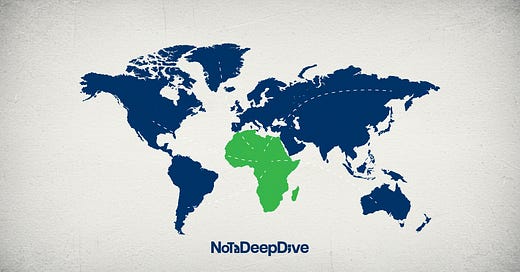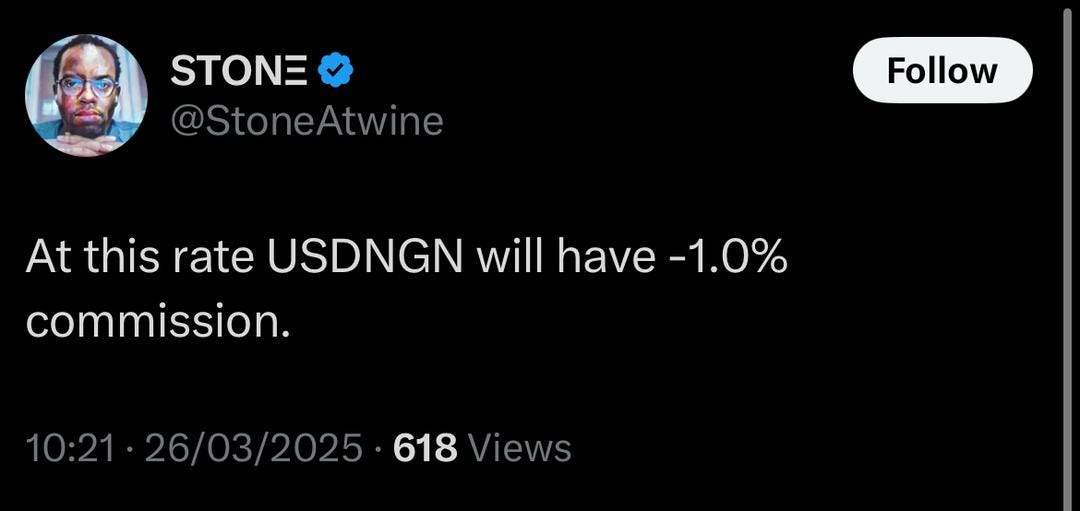PR People Need to Relax
Does tech PR have a clarity problem?
On Wednesday, I read a headline about a startup that secured $4 million to “power clean energy financing in Africa.” No clue what that meant, so I kept scrolling.
A few hours later, while driving past Ikoyi, I saw the company’s ad: loans for setting up solar power. That, I understood.
We need fewer rooms where tech journalists and founders hash out their grievances and more rooms where PR teams figure out how to write press releases that people understand.
Another Day, Another Remittance Play
Moniepoint is testing a remittance product for the UK market. You could almost set your watch to it; every other month, another fintech launches a remittance play.
You. Must. Send. Money. Back. Home.
I had a conversation with Nnanna and instead of giving you a long-winded analysis, I figured I'd just share the conversation.
Nnanna: It looks solid and expected. I have questions, but I’ve learned to tread carefully when discussing remittance apps. I once got dragged in a random group chat for recommending (redacted) as the best end-to-end experience. People defending a remittance app more fiercely than their banks? Not on my 2024 bingo card.
Mosco: Lemfi says it has 1 million users, with 60% active monthly. I’ll look left and right before daring to recommend another app to any of them.
N: My technical stance remains: account-to-account transfers are superior. The alternative (card-to-account) is just extra steps for no reason. Moniepoint’s play looks like it leans account-to-account, but even if it isn’t, superior tech still has to bow to the market sometimes.
M: You don’t know when to let go. This is why they slapped your head in the group chat.
But here’s what keeps me up at night: with everyone competing on rates, doesn’t this turn remittance into just another low-margin, high-volume game? And with the naira stabilizing, how long before the rate wars stop making sense?
N: That train has already left the station. Remittance is not exactly lucrative, but it powers growth.
M: Back to Moniepoint. This move makes perfect sense for them; it connects the diaspora to their existing banking rails. And since it’s account-to-account, users will likely receive funds directly into Moniepoint accounts.
N: Exactly. They could even start offering Nigerian accounts to UK users before they ever set foot in Nigeria. A potential multi-currency play.
M: And they already own the retail crowd. I’m side-eyeing Zap.
N: Apples and oranges. Zap is going for global remittance; Moniepoint is starting with a UK focus. Moniepoint’s remittance arm strengthens their ecosystem, while Zap feels like a standalone bet. I still don’t see how it fits into Paystack’s flywheel yet.
M: For the first time in a while, Nigerian fintech is playing offense, not just defense. If you blink, you might miss something big.
Let’s close out today’s newsletter with a bit of the familiar.
A Potential Ban on Solar Panel Imports is a Familiar Bad Idea
After three years of enduring NEPA (I’m a millennial, please. It’ll take a while before I start saying Ikeja Electric or Eko Disco), I moved off-grid in early March. It took a year of planning, research (there are a ton of solar DIY communities in Nigeria), and buying things in bits and pieces because, you know, poor journalist.
One of the first things you learn when setting up solar in Nigeria is that cutting corners is practically a business model. It shows up in different ways:
You hire a charlatan, spend millions, and end up with a system that powers way less than you expected. Some of this is because installers know people can’t afford the systems they actually need, so they lie.
If you go the DIY route, you realize quickly that labels mean nothing. A 615W panel could really be 400W. The same goes for batteries.
If you buy solar panels from anyone who isn’t an authorized dealer, you’re playing “sure two odds” with your money.
Because of all this, I know quite a few people who would rather buy small items like circuit breakers from AliExpress. The local market hasn’t figured out how to disincentivize sharp practices. If anything, Nigeria’s solar market needs more competition and proper standards.
But instead of addressing that, we’re going the usual route: banning imports to force local production.
Here’s an excerpt from one publication:
“The Federal Government of Nigeria has unveiled plans to prohibit the importation of solar panels, aiming to bolster local manufacturing and expedite the nation’s shift toward clean energy solutions. This initiative aligns with Presidential Executive Order No. 5, which prioritizes local content in science, engineering, and technology sectors.”
Where have we seen this before?
The Buhari administration used similar logic to ban rice imports, arguing that local farmers would step in, get rich, and make Nigeria food-sufficient. Today, food inflation is at 23.51%, and that one dumb policy has been hard to undo.
Didn’t we try this with cars too? Two decades later, ridiculous import duties have ensured very few people can actually buy one.
Why are we addicted to bad ideas that never work?
Bonus: Two Nigerian Banks Join the ₦1 Trillion Profit Club
It’s earnings season. Zenith and GTCO are the first Nigerian banks to record ₦1 trillion ($650 million) in profit in a calendar year (FY 2024). Cue all the hot takes about making trillions while the economy is in the gutter.
See you on Sunday!







Apparently email replies go directly to the author. ...Was thinking of buying a multimeter yesterday to test the panels before buying. Also, fouani is sold out so we're(those who haven't bought) in trouble.